当前位置:
X-MOL 学术
›
ACS Appl. Polym. Mater.
›
论文详情
Our official English website, www.x-mol.net, welcomes your feedback! (Note: you will need to create a separate account there.)
Biopolymer Systems in Soft Tissue Engineering: Cell Compatibility and Effect Studies Including Material, Catalyst, and Surface Properties
ACS Applied Polymer Materials ( IF 5 ) Pub Date : 2020-07-08 , DOI: 10.1021/acsapm.0c00359 Cordula S. Hege 1, 2 , Dorothea Siegel-Axel 3 , Konrad Kohler 4 , Nicolas Delorme 5 , Vincent Le Houérou 6 , Stefan M. Schiller 2, 7 , Jürgen H. Dolderer 8
ACS Applied Polymer Materials ( IF 5 ) Pub Date : 2020-07-08 , DOI: 10.1021/acsapm.0c00359 Cordula S. Hege 1, 2 , Dorothea Siegel-Axel 3 , Konrad Kohler 4 , Nicolas Delorme 5 , Vincent Le Houérou 6 , Stefan M. Schiller 2, 7 , Jürgen H. Dolderer 8
Affiliation

|
Cell compatibility of biomaterials is one of the most important issues in tissue engineering. It is affected by the catalyst, the chemical composition, and the surface topography of the material. Our aim was to study the influence of these factors for three standard FDA-approved biopolymers on the proliferation of preadipocytes. The analyzed materials were polyesters, which were synthesized by ring-opening polymerization. Tin(II) octanoate is the standard catalysts for the ring-opening polymerization; however, it is considered to be cytotoxic. Therefore, we compare its compatibility with iron catalysts. Our study suggests that neither polymers nor catalysts or mechanical properties have a significant impact on cell compatibility in short-term 2D cell cultures in vitro. In contrast, nanoroughness can influence how cells attach and spread in a material, showing an influence on preadipocyte proliferation. Higher nanoroughness leads to higher cell compatibility, which becomes more pronounced with time.
中文翻译:

软组织工程中的生物聚合物系统:细胞相容性和效应研究,包括材料,催化剂和表面性质
生物材料的细胞相容性是组织工程中最重要的问题之一。它受催化剂,化学成分和材料表面形貌的影响。我们的目的是研究这些因素对三种标准的FDA批准的生物聚合物对前脂肪细胞增殖的影响。被分析的材料是聚酯,它是通过开环聚合反应合成的。辛酸锡(II)是开环聚合的标准催化剂;但是,它被认为具有细胞毒性。因此,我们比较了它与铁催化剂的相容性。我们的研究表明,聚合物,催化剂或机械性能均不会对短期2D细胞体外培养的细胞相容性产生重大影响。相反,纳米粗糙度会影响细胞在材料中的附着和扩散方式,从而显示出对前脂肪细胞增殖的影响。较高的纳米粗糙度导致较高的电池相容性,随着时间的推移,相容性会变得更加明显。
更新日期:2020-08-14
中文翻译:

软组织工程中的生物聚合物系统:细胞相容性和效应研究,包括材料,催化剂和表面性质
生物材料的细胞相容性是组织工程中最重要的问题之一。它受催化剂,化学成分和材料表面形貌的影响。我们的目的是研究这些因素对三种标准的FDA批准的生物聚合物对前脂肪细胞增殖的影响。被分析的材料是聚酯,它是通过开环聚合反应合成的。辛酸锡(II)是开环聚合的标准催化剂;但是,它被认为具有细胞毒性。因此,我们比较了它与铁催化剂的相容性。我们的研究表明,聚合物,催化剂或机械性能均不会对短期2D细胞体外培养的细胞相容性产生重大影响。相反,纳米粗糙度会影响细胞在材料中的附着和扩散方式,从而显示出对前脂肪细胞增殖的影响。较高的纳米粗糙度导致较高的电池相容性,随着时间的推移,相容性会变得更加明显。


























 京公网安备 11010802027423号
京公网安备 11010802027423号